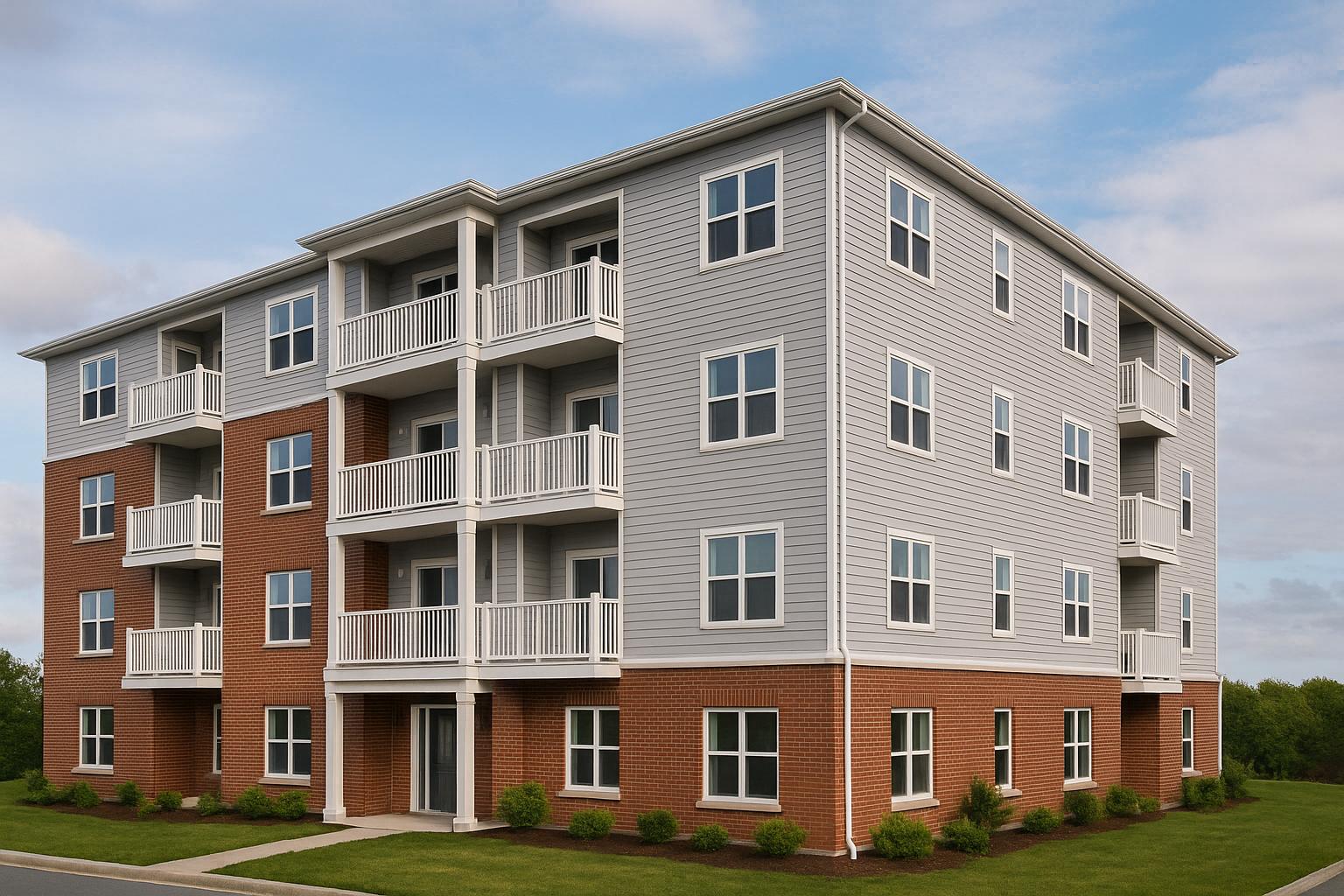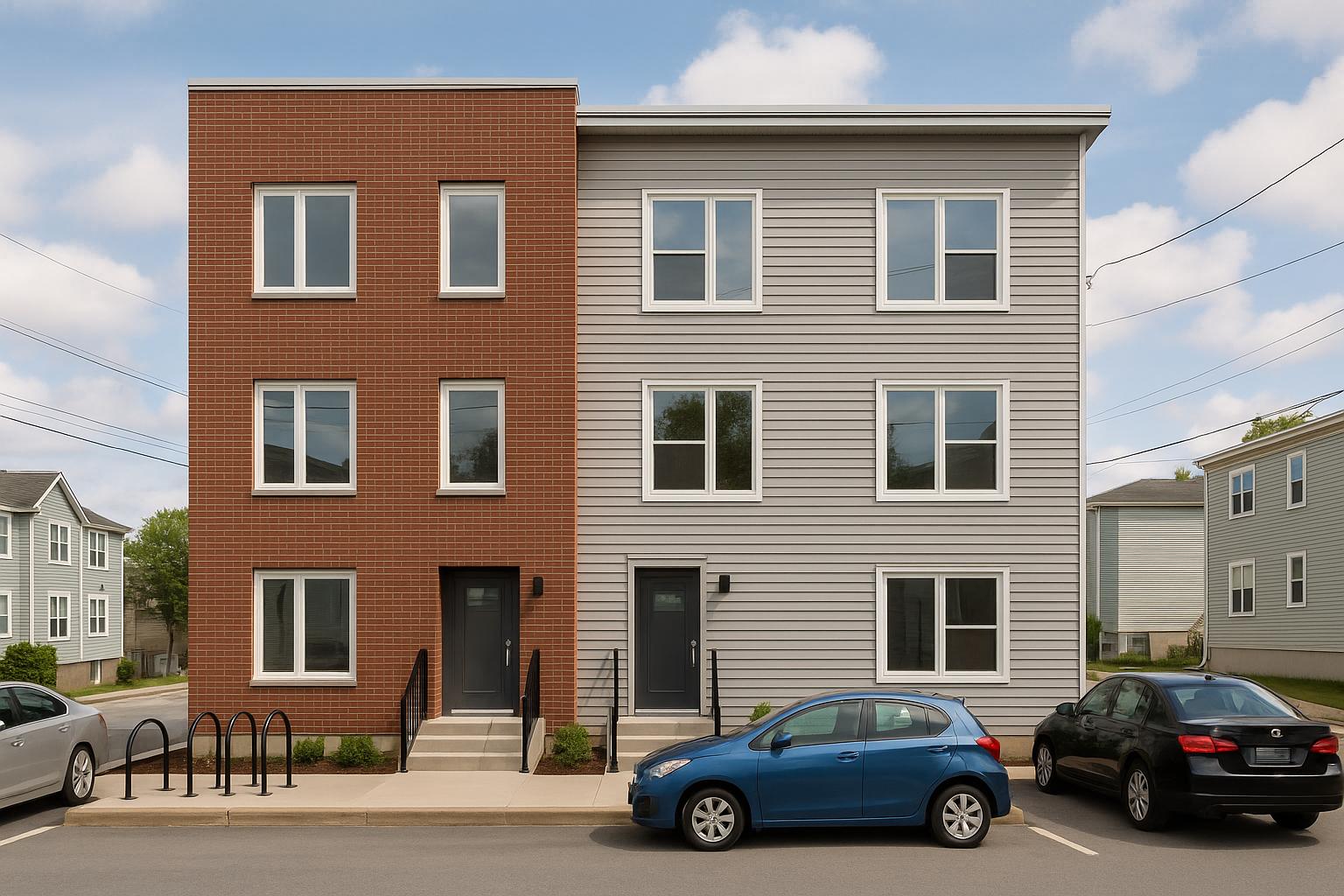When building multi-unit properties in Halifax, choosing between an integrated builder and a general contractor can significantly impact your project’s success. Here's the key takeaway: Integrated builders handle permits and Site Plan Approval (SPA) entirely in-house, ensuring faster timelines, fixed costs, and fewer delays. In contrast, general contractors require you to coordinate multiple specialists for these approvals, often leading to miscommunication, higher costs, and extended timelines.
Key Differences:
- Integrated Builders: Manage everything under one roof, offering fixed-price contracts, guaranteed timelines, and single-source accountability.
- General Contractors: Divide responsibilities among separate professionals, increasing coordination burdens, timeline risks, and budget unpredictability.
Quick Comparison:
| Aspect | Halifax Builder (Integrated) | General Contractor (Fragmented) |
|---|---|---|
| Permit/SPA Management | Handled in-house | Requires external specialists |
| Accountability | Single company | Divided among multiple parties |
| Timeline | Guaranteed, penalties for delays | Often delayed due to miscommunication |
| Cost | Fixed-price contracts | Unpredictable, with frequent changes |
| Coordination | Minimal effort for property owner | High effort, managing multiple teams |
For multi-unit projects, integrated builders simplify the process, save time, and reduce financial risks. If avoiding delays and cost overruns matters, working with an integrated builder is the better choice.
How Halifax Builders Handle Permits and SPA
Halifax builders specializing in multi-unit construction take a distinct approach to handling permits and Site Plan Approval (SPA). Unlike traditional contractors, integrated Halifax builders manage the regulatory process entirely in-house, streamlining the experience for property owners. Here's how their method works and why it benefits developers.
Integrated Design-Build Process
When you partner with an integrated Halifax builder, their team takes charge of permitting and SPA from the outset. This process involves planners reviewing zoning and land use requirements, architects drafting site and building plans to meet Halifax's regulations, and engineers ensuring compliance with structural, civil, and environmental standards. Since all these professionals work under one roof, collaboration is seamless.
The process begins with a feasibility study, which evaluates zoning, density, and municipal requirements, helping avoid unexpected issues down the line. For instance, Helio Urban Development exemplifies this efficiency by managing 31 active construction units and planning for 131 more. By handling everything internally - building permits, development approvals, and utility clearances - they ensure projects meet all requirements from day one.
This integrated approach also aligns architectural plans, engineering drawings, and zoning regulations internally, minimizing the chances of permit rejections. With a single company overseeing planning, design, and construction, potential conflicts are resolved early, saving time and money on reapplications or redesigns. Additionally, advanced AI scheduling tools help coordinate permits, ensuring approvals are ready exactly when needed.
By consolidating responsibilities, this method establishes clear timelines and accountability, creating a smoother path from planning to construction.
Single-Source Accountability Benefits
One of the biggest advantages of working with an integrated builder is single-source accountability. Instead of managing multiple professionals with separate contracts and conflicting schedules, property owners rely on one company to handle the entire permitting and SPA process.
Fixed-price contracts with penalty clauses provide financial predictability, eliminating budget surprises. According to industry data, integrated design-build projects achieve approval times 20–30% faster than those managed by separate contractors. Communication is also more straightforward, with property owners receiving updates through dedicated project managers, digital dashboards, and scheduled check-ins.
The financial benefits are substantial. The Construction Industry Institute reported in 2023 that design-build models can cut project delivery times by up to 33% compared to traditional methods. For a multi-unit project, where carrying costs can reach $8,000 per month, these time savings directly translate into preserved capital and quicker rental income.
Quality assurance also improves under this model. Integrated builders often perform multiple inspections by professional engineers (P.Eng) throughout the project, ensuring compliance with building codes and reducing the likelihood of delays or unexpected costs. This comprehensive oversight ultimately delivers a smoother, more efficient construction process for property owners.
How General Contractors Handle Permits and SPA
General contractors typically manage permits and Site Plan Approval (SPA) for multi-unit construction projects by dividing the process into separate phases. Instead of handling everything in-house, they hire independent professionals for each stage. While this approach might seem practical, it often leads to operational and financial headaches for property owners.
Fragmented Coordination and Divided Responsibilities
When property owners rely on general contractors, they often end up hiring separate specialists - architects, engineers, and planning consultants - who work independently. This can result in mismatched schedules and conflicting requirements. For instance, if an architect designs a plan without consulting the structural engineer, the municipal review process may identify problems, delaying permits. Similarly, when the Halifax Regional Municipality requests changes to SPA submissions, relaying those updates across multiple parties can make communication even more complicated.
This lack of integration puts property owners in the tough spot of juggling multiple contracts and ensuring that all documentation aligns, which can lead to delays and unnecessary complexity.
Challenges for Property Owners
These coordination issues translate into real-world problems for property owners. The segmented approach often leads to permit and SPA delays caused by miscommunication and repeated revisions. On top of that, independent billing and frequent change orders can make costs unpredictable, adding financial stress to the project.
With responsibilities spread across different parties, resolving problems often requires drawn-out negotiations rather than quick fixes. This fragmented system not only increases administrative burdens but also raises financial risks, making the process of managing permits and SPA approvals through general contractors more challenging than it needs to be.
Halifax Builder vs General Contractor: Permits and SPA Comparison
When it comes to multi-unit construction projects, the differences between integrated builders and general contractors become especially clear in how they handle permits and Site Plan Approval (SPA). These two approaches impact everything from timelines to costs and overall project management.
Side-by-Side Comparison Table
| Aspect | Halifax Builder (Integrated) | General Contractor (Fragmented) |
|---|---|---|
| Permit/SPA Application | Managed entirely by an in-house team | Requires property owners to coordinate multiple specialists |
| Accountability | One company takes full responsibility | Divided among architects, engineers, and consultants |
| Timeline Reliability | Guaranteed completion dates with penalties | Delays common due to miscommunication between parties |
| Cost Certainty | Fixed-price contracts, no overruns | Cost-plus model with unpredictable change orders |
| Coordination Burden | Minimal for property owner | High – property owner must manage multiple contracts |
| Problem Resolution | Issues resolved immediately by internal team | Requires back-and-forth between separate companies |
| Documentation Control | All plans and permits handled by one team | Property owner must track submissions from various firms |
The biggest distinction lies in accountability. For example, when Helio Urban Development manages permits and SPA for clients, they promise completion within six months. If they miss the deadline, they pay penalties of up to $1,000 per day. This level of commitment is possible because their planners, architects, engineers, and construction teams all work under one roof.
On the other hand, general contractors often struggle with coordination. Property owners frequently describe the process as chaotic, especially when the Halifax Regional Municipality requests changes to SPA submissions. General contractors must pass those updates to multiple independent specialists, each billing separately for revisions. This fragmented process can stretch approval timelines significantly.
Beyond timelines, integrated builders also help stabilize costs. They set fixed unit costs - $160,000 per unit in this case - eliminating the budget overruns (often 30–60%) that are common with fragmented methods. For property owners constructing fourplexes or larger rental properties, these differences can have a major financial impact. A missed six-month construction deadline could mean losing approximately $8,800 in rental income per month for a typical fourplex. An integrated approach minimizes this risk, offering both financial stability and peace of mind.
sbb-itb-16b8a48
Common Permit and SPA Problems (and How Integrated Builders Fix Them)
Starting a multi-unit construction project in Halifax often comes with its fair share of challenges, especially during the permit and Site Plan Approval (SPA) process. One of the biggest hurdles? A fragmented approach where different specialists - architects, engineers, and planners - work independently. This disjointed method can lead to delays, miscommunication, and higher costs.
Typical Problems with Fragmented Construction
Incomplete or Inconsistent Documentation
When separate teams work in isolation, the documentation submitted to municipal authorities often lacks alignment. This inconsistency can result in delays and the need for revisions, pushing back approval timelines.
Communication Breakdowns
Changes made by one team may not be effectively communicated to others. This back-and-forth slows down the process and increases costs, as each team charges for their individual adjustments.
Unpredictable Timelines
Fragmented workflows can stretch project timelines from the usual 8–12 months to over 18 months. These delays can lead to significant financial losses, especially in rental income.
Budget Overruns
Separate billing by different teams can inflate costs by 30–60%. For example, a project initially estimated at $500,000 can easily exceed its budget due to unanticipated expenses.
Accountability Gaps
With multiple parties involved, it's often unclear who is responsible for resolving issues, which leads to further delays and uncertainty.
Integrated builders provide a solution to these issues by offering a streamlined, unified approach.
How Integrated Builders Prevent These Problems
Integrated builders, like Helio Urban Development, tackle these challenges head-on by bringing all key players - planners, architects, engineers, and construction teams - under one roof. This cohesive approach ensures smoother SPA and permit approvals while improving efficiency and accountability.
Complete Documentation Control and Direct Communication
With an integrated team, regular reviews and direct communication ensure that any required municipal changes are addressed quickly. This eliminates the delays caused by coordinating between separate companies.
Guaranteed Timelines
Helio takes full control of the project timeline, offering guaranteed construction completion within six months. To provide further assurance, they even pay penalties of up to $1,000 per day if deadlines are missed. This approach helps property owners avoid losing an estimated $8,800 in monthly rental income due to delays.
Fixed-Price Certainty
Helio offers a transparent fixed-price model of $160,000 per unit, covering all permit fees, design, and construction costs. This upfront pricing eliminates the risk of unexpected budget increases, giving property owners peace of mind.
Single-Source Accountability
By managing every phase of the project internally, integrated builders simplify communication with a single point of contact. Helio goes a step further by providing daily photo updates and access to a real-time project portal, ensuring property owners stay informed and issues are resolved quickly.
Choosing the Right Partner for Permits and SPA
When you're planning to build multi-unit rental properties in Halifax, your choice between an integrated builder and a general contractor can make or break the efficiency of your permits and Site Plan Approval (SPA) process. The numbers back it up: integrated design-build approaches are ideal for property owners looking for smoother operations and predictable outcomes.
The most critical advantage? Single-source accountability. With an integrated builder like Helio Urban Development, you deal with just one point of contact who takes care of all regulatory requirements. Helio's co-founder, Lloyd Liu, personally guarantees every timeline, ensuring no miscommunications arise from having multiple parties involved. This streamlined approach simplifies financial decisions and keeps your project timelines on track.
Cost considerations are another major factor. General contractors often charge management fees ranging from 10% to 20% of the total project cost[2]. While integrated builders may require higher upfront payments, they can save you an average of $47,000 by eliminating coordination inefficiencies. For example, Helio offers a fixed-price model of $160,000 per unit, covering everything from design and permits to construction. This removes the guesswork from budgeting.
Timelines matter, especially when rental income is at stake. Projects managed by integrated design-build teams see up to 33% fewer change orders and are completed 20% faster than those using traditional fragmented approaches[1]. Helio even provides a six-month construction guarantee, protecting you from losing approximately $8,800 in monthly rental income due to delays.
Integrated builders also excel in navigating the complexities of permits and SPA for multi-unit developments. Their ability to handle everything under one contract ensures a smoother process. While general contractors might be better suited for diverse or owner-managed projects, integrated builders bring the specialized expertise required for multi-unit builds.
Before committing to a partner, make sure to evaluate their track record with municipal approvals, ask for references from similar projects, and secure a clear, detailed contract. Choosing the right integrated builder could mean faster approvals, consistent costs, and a smoother construction experience overall.
FAQs
What are the benefits of choosing an integrated builder for permits and Site Plan Approval (SPA) in Halifax?
Choosing an integrated builder for permits and Site Plan Approval (SPA) in Halifax comes with several benefits that can make your construction project far less complicated. With one team handling all responsibilities, the process becomes more efficient, communication is clearer, and there’s a single point of contact to keep everything on track.
This approach also helps navigate the approval process more efficiently, cutting through the typical red tape and avoiding drawn-out delays. The result? Faster timelines, better control over your budget, and fewer surprises along the way. For property owners, this means a smoother, more dependable journey from start to finish.
What are the advantages of working with an integrated builder for permits and Site Plan Approval (SPA) compared to a general contractor?
Working with an integrated builder simplifies the process for property owners by providing one clear point of accountability for tasks like managing permits, Site Plan Approval (SPA), and construction. Instead of coordinating with multiple contractors, everything is handled through a single contact, which helps minimise miscommunication and potential delays.
This approach promotes better organisation, keeps costs more predictable, and makes the approval process much smoother. By consolidating responsibilities under one roof, an integrated builder helps sidestep common hurdles, keeping your project on schedule and fully compliant with local regulations.
What challenges can arise when relying on a general contractor for permits and Site Plan Approval (SPA), and how can property owners avoid them?
Relying on a general contractor to handle permits and Site Plan Approvals (SPA) can sometimes lead to headaches. Delays caused by incomplete paperwork, miscommunication between different parties, or gaps in planning can quickly drive up costs and bring progress to a halt. These setbacks often arise due to the fragmented way traditional construction projects are managed.
To sidestep these issues, property owners should stay actively involved by maintaining clear communication with their contractor, ensuring detailed plans are in place, and keeping a close eye on the process. Another smart move? Partnering with an integrated design-build team. This approach can simplify approvals, cut down on delays, and help ensure everything aligns with Canadian regulations - saving both time and money in the long run.
Related Blog Posts
- Choosing the Right Builder in Halifax: 5 Key Factors for Multi-Unit Projects
- Halifax’s New Zoning Rules Explained: Up to Four Units on a Single Lot (What It Means for Builders)
- HR-2 Halifax Development: 20+ Units Require Specialized Builders
- Halifax Apartment Builder Costs 2025: What Drives $/Unit in Urban Areas



